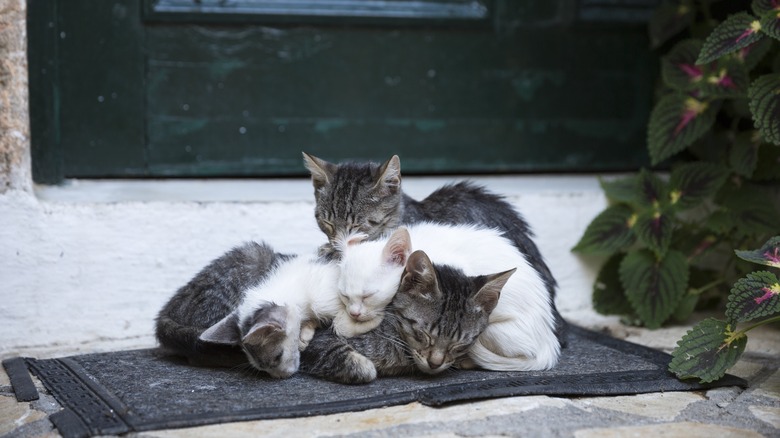TikTok Is Exposing The Most Adorable Reason Your Next Vacation Should Be To Greece
Many come to Greece for the food — from saganaki to spanakopita — while others hop around its 6,000 islands — from Santorini to Syros. Tourists explore the shipwreck of Zakynthos and many more flock to the Acropolis in Athens. But the real, more adorable reason your next vacation should be to Greece? Cats. Greece's white-washed buildings, azure waters, and ancient ruins provide a unique backdrop for the countless cats that roam freely across the country. These feline residents have become social media stars on TikTok, attracting cat lovers from around the globe.
@katkatorokova Cats in Athens 😻😻 #greece #athens #catsoftiktok #cat #cats #catsingreece #fyp #foryou #foryoupage #catlover #cattok #catlovers
Cats, or γάτα "gáta" for "cat" in Greek, have been an integral part of Greek culture for thousands of years. Historical records suggest that ancient Greeks revered cats as divine beings, and some Olympian gods, such as the goddess Artemis, even had cats as their companions. One theory is that they came to Greece from Egypt during the Minoan age, between 1,100 and 3,000 BCE, and quickly became symbols of good luck. Pets to all — from sailors to nobles — their hunting skills and ability to control pests made them indispensable members of Greek society.
This long-standing bond has endured (for the most part), and today, cats are a ubiquitous presence in Greek life. From the bustling streets of Athens to the tranquil villages of Kasos, cats can be found lounging on sunny rooftops, exploring narrow alleyways, and basking in the warm Mediterranean sun. So if you say you came to Greece for the culture — the culture being cats — that's purrfect.
Tips for making feline friends in Greece
Travel influencers and everyday tourists have shared countless videos of their encounters with these Greek felines. Although cats are found everywhere in Greece, Athens has a particularly large population, along with towns like Piraeus and Kifissia. The Greek islands, Oia, Hydra, and Syros are renowned for their cat colonies. Cat lovers visiting these gorgeous islands will thrive while being greeted by kitties who are happy to receive a treat and a scratch behind their ears.
@bradyinlondon Can confirm I am just in Greece for the cats, the 200+ photos & videos of cats on my phone should be enough evidence 🐱🫶🏻 #greece #greek #greekislands #cats #greekcats #zipline #santorini #milos #ios #kittens #paros #holiday #gyros #eurosummer
For any cat lovers planning a trip to Greece, we have some tips to enhance your feline-friendly adventure. First, you must remember that not all cats are friendly! Some cats might carry zoonotic diseases that can be passed down to humans or have aggressive tendencies and are best observed from afar. If you notice that a cat is curious, calm, and receptive to you, it's likely safe to pet them gently. Always observe the cat's body language and respect their boundaries.
If a cat has a collar, it's probably a stray cat (lost or abandoned pet) or a domesticated free-roaming cat. Otherwise, they are considered feral. A bag of cat food and some water can help you make new friends and create memorable interactions — you can buy some at a convenience, grocery, or pet shop. Do not give milk to cats because they are lactose intolerant, and don't feed them from your restaurant table as it may upset the owners and result in harmful consequences for the cats.
How to make a difference as a traveling cat lover
But beyond the cuteness of short-lived TikTok videos is a life of feline struggle. According to Animal Action Greece, the country is home to an estimated 3 million stray cats, many of which live short, difficult lives without reliable shelter or veterinary care, marred by the relentless search for their next meal. During the tourist season, they get fed, petted, and cared for by cat-loving travelers. However, once the tourists leave, a cat's life becomes pretty miserable as it has to fend for itself once again. Although some kind-hearted locals in Greece support their neighborhood's cat colony, equally as many cat-hating people treat and perceive them as vermin. There have been reports of mass poisonings, kitten litters being dumped in garbage bins, and other instances of terrible brutality.
If you love cats and care about animal welfare, there are ways you can help. Trap-Neuter-Return (TNR) has been proven to be the most humane and effective method of controlling growing populations of street cats. Bringing a cat (ideally a male) for neutering or a sick, injured cat (especially one with cat flu) for medical care to a vet is immensely helpful. Tourists can also make a difference by adopting Greek cats, feeding community colonies, helping at a shelter, and donating or volunteering for organizations like Nine Lives Greece, Greek Cat Care Foundation, and Greek Cat Welfare Society. If you witness cats subjected to human-inflicted cruelty, contact the police by dialing 100.


